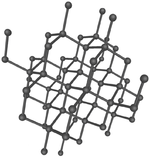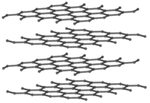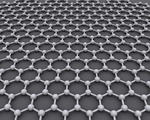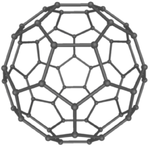Difference between revisions of "Carbon"
| Line 1: | Line 1: | ||
| + | ==Key Stage 3== | ||
| + | ===Meaning=== | ||
| + | [[Carbon]] is an [[element]] containing 6 [[proton]]s. | ||
| + | |||
| + | ===About Carbon=== | ||
| + | : [[Carbon]] is [[solid]] at [[Room Temperature|room temperature]]. | ||
| + | : [[Carbon]] can form [[graphite]] or [[diamond]]. | ||
| + | |||
==Key Stage 4== | ==Key Stage 4== | ||
===Meaning=== | ===Meaning=== | ||
[[Carbon]] is an [[element]] containing 6 [[proton]]s. | [[Carbon]] is an [[element]] containing 6 [[proton]]s. | ||
| + | |||
| + | ===About Carbon=== | ||
| + | : The most common [[isotope]] of [[carbon]] is [[Carbon-12]] which has 6 [[proton]]s and 6 [[neutron]]s in the [[Atomic Nucleus|nucleus]]. | ||
| + | : [[Carbon]] has 4 [[electron]]s in its [[Outer Shell|outer shell]] so it can form 4 [[bond]]s with other [[atom]]s. | ||
| + | : [[Carbon]] is able to make long chains of [[atom]]s to produce [[compound]]s called [[polymer]]s. | ||
| + | There are several [[allotrope]]s of [[Carbon]] including: | ||
| + | *[[Graphite]] | ||
| + | *[[Diamone]] | ||
| + | *[[Graphene]] | ||
| + | *[[Fullerenes]] | ||
| + | |||
| + | ===Examples=== | ||
| + | ===Examples=== | ||
| + | {| class="wikitable" | ||
| + | |- | ||
| + | |[[File:DiamondStructure.png|center|150px]] | ||
| + | |[[File:GraphiteStructure.png|center|150px]] | ||
| + | |[[File:GrapheneStructure.png|center|150px]] | ||
| + | |[[File:FullereneStructure.png|center|150px]] | ||
| + | |- | ||
| + | | style="height:20px; width:150px; text-align:center;" |[[Diamond]] is a '''giant covalent structure''' where each [[Carbon]] [[atom]] has 4 bonds with [[adjacent]] [[atom]]s. | ||
| + | | style="height:20px; width:150px; text-align:center;" |[[Graphite]] has a '''giant covalent structure''' with each [[Carbon]] [[atom]] has 3 bonds with [[adjacent]] [[atom]]s in a layer with loose [[bond]]s between the layers. | ||
| + | | style="height:20px; width:150px; text-align:center;" |[[Graphene]] has a '''giant covalent structure''' where each [[Carbon]] [[atom]] has 3 bonds with [[adjacent]] [[atom]]s forming a layer that is one [[atom]] thick. | ||
| + | | style="height:20px; width:150px; text-align:center;" |[[Fullerene]]s have a '''giant covalent structure''' where each [[Carbon]] [[atom]] has 3 bonds with [[adjacent]] [[atom]]s forming a [[sphere]]. | ||
| + | |} | ||
Revision as of 17:48, 31 December 2018
Contents
Key Stage 3
Meaning
Carbon is an element containing 6 protons.
About Carbon
Key Stage 4
Meaning
Carbon is an element containing 6 protons.
About Carbon
- The most common isotope of carbon is Carbon-12 which has 6 protons and 6 neutrons in the nucleus.
- Carbon has 4 electrons in its outer shell so it can form 4 bonds with other atoms.
- Carbon is able to make long chains of atoms to produce compounds called polymers.
There are several allotropes of Carbon including:
Examples
Examples
| Diamond is a giant covalent structure where each Carbon atom has 4 bonds with adjacent atoms. | Graphite has a giant covalent structure with each Carbon atom has 3 bonds with adjacent atoms in a layer with loose bonds between the layers. | Graphene has a giant covalent structure where each Carbon atom has 3 bonds with adjacent atoms forming a layer that is one atom thick. | Fullerenes have a giant covalent structure where each Carbon atom has 3 bonds with adjacent atoms forming a sphere. |



